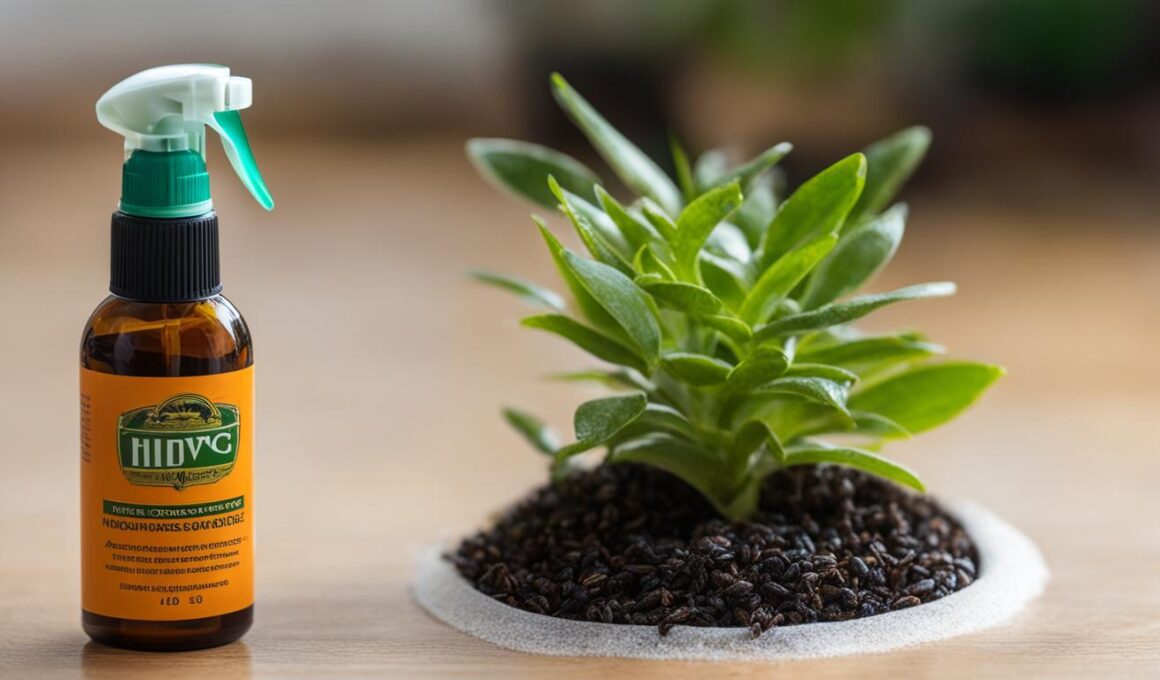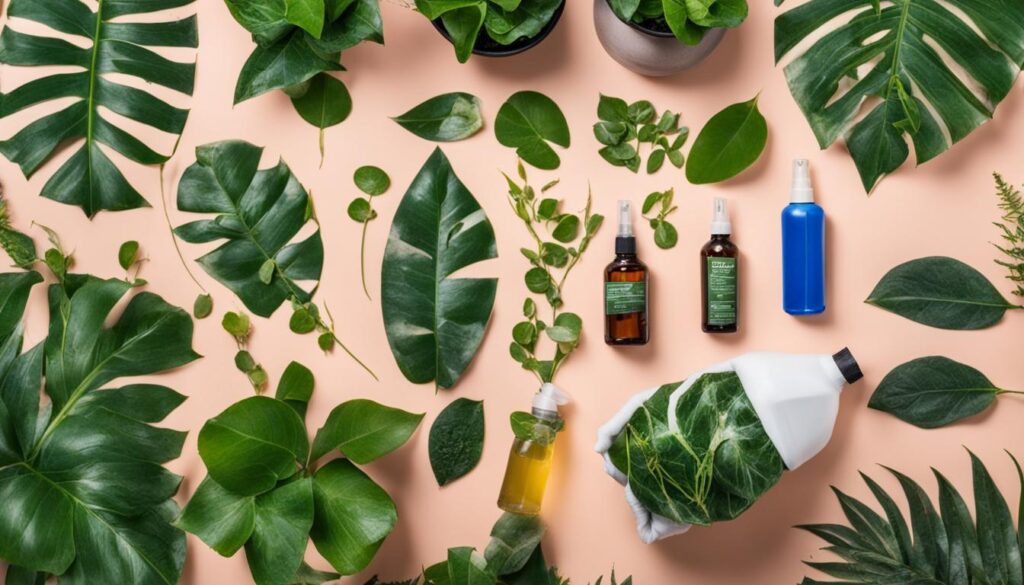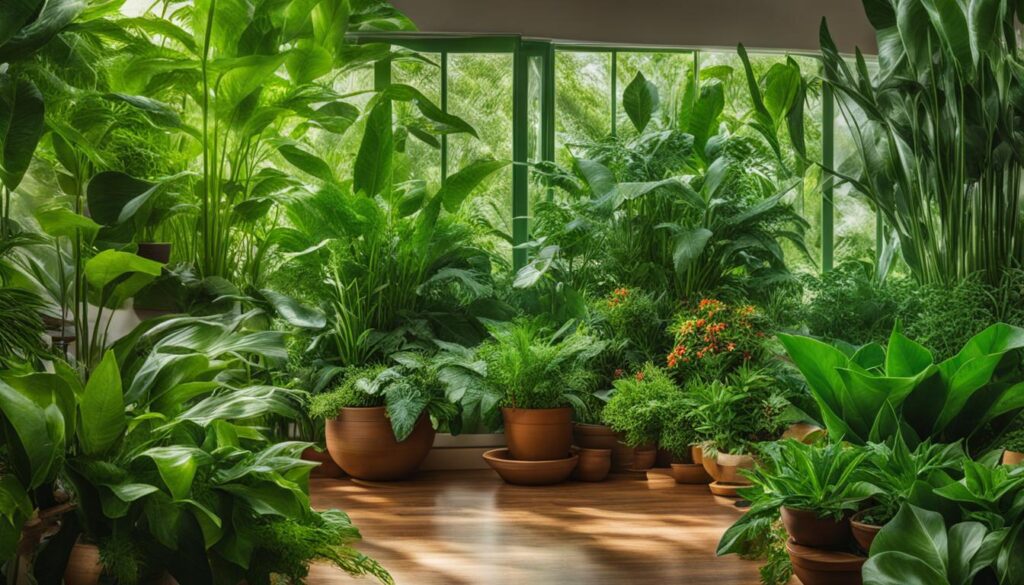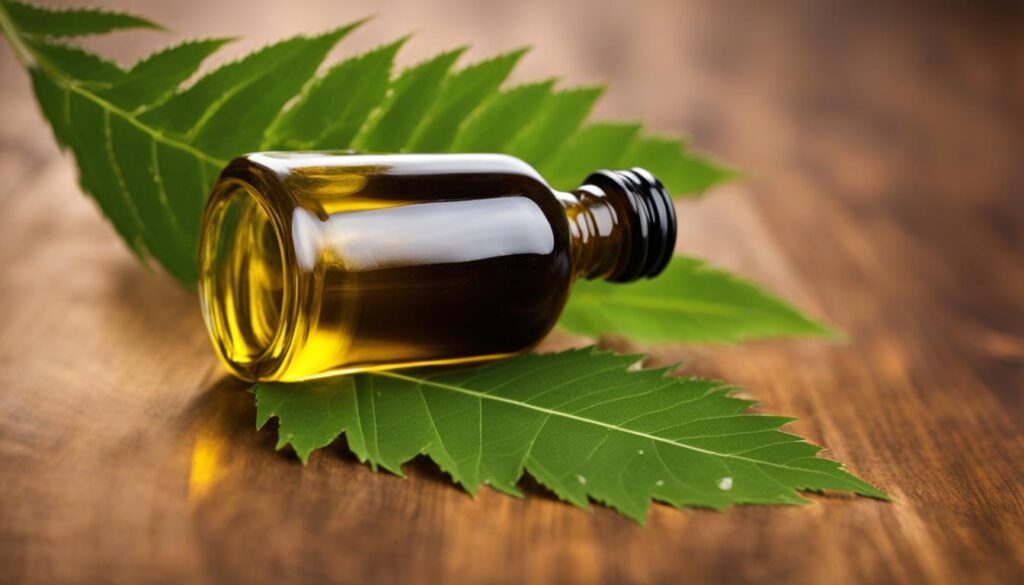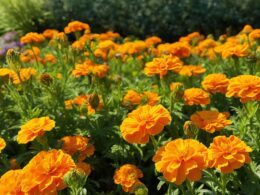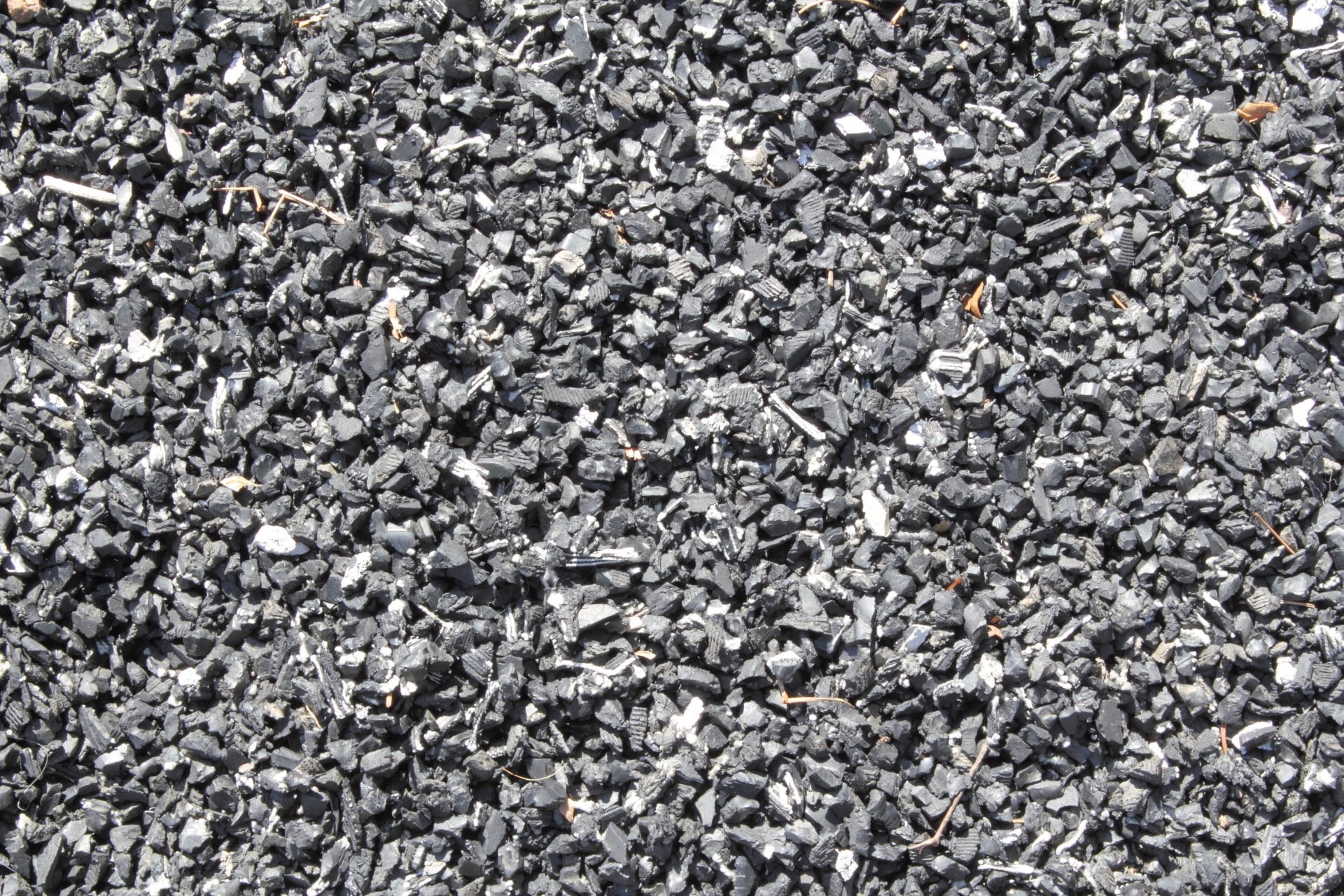Indoor plants add beauty and a sense of tranquility to your home, but they are also vulnerable to insect infestations that can damage their health and appearance. To ensure the well-being of your greens, it is crucial to use an effective indoor plants insecticide. In this article, we will provide you with information on various natural and homemade insecticides that can help you combat pests without harming your plants or the environment.
Key Takeaways:
- Indoor plants are prone to insect infestations that can harm their health and appearance.
- Using an effective indoor plants insecticide is crucial to keep your greens safe and thriving.
- Natural and homemade insecticides are safe alternatives to chemical-based products.
- Precautions and considerations should be taken when using indoor plants insecticides.
- Neem oil and diatomaceous earth are powerful natural insecticides for indoor plants.
Precautions and Restrictions for Using Indoor Plants Insecticides
When it comes to protecting your indoor plants from pests, using an effective insecticide is crucial. However, it is equally important to follow certain precautions and restrictions to ensure the safety and effectiveness of these products.
Here are some general guidelines to keep in mind when using indoor plants insecticides:
- Do not allow people or pets to enter the treated area until the spray has dried. This is to avoid any potential contact with the insecticide.
- Avoid direct contact with the spray. If you need to handle it, make sure to wear protective gloves and clothing.
- Cover fish aquariums before applying the insecticide to prevent any accidental exposure to aquatic life.
- Apply the insecticide in non-windy conditions to prevent drift and ensure proper coverage on the plants.
- Avoid overwatering the treated areas, as excess moisture can dilute the insecticide and reduce its effectiveness.
- Do not use indoor plants insecticides in outdoor residential misting systems, as they are designed for different applications.
It’s important to note that these are general precautions, and specific instructions may vary depending on the product. Always read and follow the instructions provided on the insecticide label for the best results.
By following these precautions and restrictions, you can use indoor plants insecticides safely and effectively, protecting your greens from harmful pests without compromising their health or the environment.
Table: Precautions and Restrictions for Using Indoor Plants Insecticides
| Precautions | Restrictions |
|---|---|
| Do not allow people or pets to enter the treated area until the spray has dried | Do not use indoor plants insecticides in outdoor residential misting systems |
| Avoid direct contact with the spray | |
| Cover fish aquariums before applying the insecticide | |
| Apply the insecticide in non-windy conditions | |
| Avoid overwatering the treated areas |
“Using indoor plants insecticides can effectively control pests, but it’s crucial to take precautions to ensure everyone’s safety.”
Natural Homemade Indoor Plants Insecticides
When it comes to protecting your indoor plants from pesky insects, natural and homemade insecticides are a safe and effective solution. Not only do these alternatives avoid the use of harmful chemicals, but they also provide an eco-friendly approach to pest control.
One popular natural insecticide is neem oil. Derived from the neem tree, this vegetable oil mixed with water and dish soap can effectively control pests like aphids and mealybugs. Neem oil disrupts the life cycle of insects at all stages, making it a versatile solution for a variety of pests. Additionally, it acts as a natural fungicide, preventing fungal infections on your plants.
Another homemade option is diatomaceous earth, a naturally occurring rock powder. When applied to plant soil, diatomaceous earth acts as an abrasive substance, dehydrating and killing insects upon contact. It is especially effective against crawling pests like ants, mites, and cockroaches.
“Using natural and homemade insecticides not only protects your indoor plants but also ensures the well-being of your greens and the environment.”
In addition to neem oil and diatomaceous earth, there are other homemade insecticides you can easily create. Garlic oil spray, made by mixing finely chopped garlic cloves with mineral oil and water, is an effective method for repelling and confusing insects. Soap sprays, made with liquid soap and water, are also great for controlling various pests without causing harm to your plants.
By utilizing natural and homemade insecticides, you can keep your indoor plants safe and pest-free while minimizing the use of chemicals in your home. Always remember to test a small area of your plants for sensitivity before applying any insecticide to the entire plant, and follow the specific instructions for optimal results.
Table: Comparison of Natural Homemade Indoor Plants Insecticides
| Insecticide | Main Ingredients | Target Pests | Effectiveness |
|---|---|---|---|
| Neem oil | Neem oil + water + dish soap | Aphids, mealybugs, and other common pests | Disrupts insect life cycle, acts as a fungicide |
| Diatomaceous earth | Naturally occurring rock powder | Crawling pests like ants, mites, and cockroaches | Dehydrates and kills insects upon contact |
| Garlic oil spray | Finely chopped garlic cloves + mineral oil + water | Repels and confuses insects | Effective against a wide range of pests |
| Soap sprays | Liquid soap + water | Various pests including beetles, mites, and aphids | Controls insects without harming plants |
Using natural and homemade insecticides not only protects your indoor plants but also ensures the well-being of your greens and the environment. These alternatives are easy to make and provide an effective solution to combat pests without the use of harsh chemicals. Make sure to choose the right insecticide for your specific pests, follow the proper precautions, and enjoy the benefits of a pest-free indoor garden.
Natural Insecticides from Common Household Ingredients
You don’t have to look far for effective insecticides to protect your indoor plants. In fact, you probably have some of them in your kitchen or pantry. Common household ingredients can be transformed into powerful natural insecticides that are safe for your plants and the environment.
Table: Homemade Natural Household Insecticides
| Ingredient | Usage | Target Pests |
|---|---|---|
| Apple cider vinegar or red wine | Fungus gnat trap | Fungus gnats |
| Neem oil | Diluted with water and dish soap | Aphids, mealybugs |
| Diatomaceous earth | Sprinkled on plant soil | Insects |
| Garlic cloves | Infused in mineral oil and water | Insects |
| Liquid soap | Mixed with water | Beetles, mites, aphids |
Apple cider vinegar or red wine can be used to create a fungus gnat trap by attracting and trapping the pests. Neem oil, when diluted with water and dish soap, becomes a potent insecticide against aphids and mealybugs. Diatomaceous earth, a rock powder, can be sprinkled on plant soil to dehydrate and kill a wide range of insects. Infusing garlic cloves in mineral oil and water creates a garlic oil spray that effectively repels and confuses insects. Liquid soap mixed with water forms a soap spray that controls beetles, mites, and aphids.
Using ingredients readily available in your home, you can whip up these natural insecticides to protect your indoor plants from pests. Not only are these homemade remedies effective, but they also provide a cost-effective and eco-friendly solution for indoor plant pest control.
It’s important to note that while natural insecticides are generally safe, it’s always recommended to test a small area of your plants for sensitivity before applying the insecticide to the entire plant. Additionally, consider the specific needs of your plants and apply the insecticides during suitable weather conditions for optimal results.
Precautions and Considerations for Using Natural Indoor Plants Insecticides
When using natural insecticides for your indoor plants, it is important to take certain precautions and considerations to ensure their effectiveness and safety. Here are some guidelines to follow:
- Test a small area: Before applying any natural insecticide to your entire plant, test it on a small area to check for any negative reactions. This will help you avoid potential damage to your plants.
- Timing and weather conditions: Avoid applying natural insecticides during hot and sunny periods or in high humidity conditions. Optimal conditions for application include cooler temperatures and low wind levels.
- Thorough coverage: When spraying the insecticide, ensure that you achieve thorough coverage of the plant foliage. This will increase its efficacy in controlling pests.
- Plant sensitivity: Different plant species may have varying levels of sensitivity to natural insecticides. It is important to research and choose the most suitable insecticide for your specific plants. Consider factors such as plant health, age, and any pre-existing conditions.
- Follow instructions: Always follow the instructions provided with the natural insecticide product. This will ensure that you use the product correctly and achieve the best results.
By following these precautions and considerations, you can effectively use natural insecticides for your indoor plants without causing harm to them or the environment.
Neem Oil and Diatomaceous Earth: Powerful Natural Indoor Plants Insecticides
When it comes to natural insecticides for indoor plants, two powerful options stand out: neem oil and diatomaceous earth. These substances not only effectively combat pests but also ensure the safety of your plants, household, and the environment. Let’s take a closer look at the benefits and applications of neem oil and diatomaceous earth as natural indoor plants insecticides.
Neem Oil
Derived from the neem tree, neem oil is a versatile insecticide known for its effectiveness against a wide range of pests. It disrupts the life cycle of insects at all stages, preventing them from reproducing and infesting your plants further. Neem oil also acts as a natural fungicide, protecting your plants from fungal infections that can be detrimental to their health. This makes neem oil an excellent choice for managing pests and promoting the overall well-being of your indoor plants.
Diatomaceous Earth
Diatomaceous earth is a naturally occurring rock powder that works as an abrasive substance against insects. When insects come into contact with diatomaceous earth, it dehydrates them, leading to their demise. This makes it an effective and natural solution for eliminating pests without the use of harsh chemicals. Diatomaceous earth can be sprinkled on the soil of your indoor plants or applied directly to affected areas to control infestations and provide long-lasting protection.
Both neem oil and diatomaceous earth offer powerful pest control capabilities while being safe for humans, pets, and the environment. By incorporating these natural indoor plants insecticides into your pest management routine, you can ensure the health, vitality, and longevity of your beloved green companions.
Are Indoor Plants Insecticides Safe for Use on All Types of Plants?
Yes, safe indoor plant pesticide use is generally considered safe for most types of plants. However, it’s important to read the label and follow instructions carefully. Some plants may be more sensitive to certain insecticides, so it’s best to do a spot test before applying to the entire plant.
Conclusion
Protecting your indoor plants from pests is crucial to maintain their health and longevity. By using effective insecticides specifically designed for indoor plants, you can eliminate harmful insects without compromising the well-being of your greens.
Whether you opt for natural options such as neem oil, diatomaceous earth, garlic oil spray, or soap sprays, or choose homemade insecticides, remember to follow proper precautions and consider the specific needs of your plants for successful pest control.
With the right insecticide treatment, you can keep your indoor plants safe, healthy, and vibrant. Invest in their protection and enjoy the beauty and benefits of a pest-free indoor garden.
FAQ
What precautions should I take when using indoor plants insecticides?
When using any indoor plants insecticide, it is important to follow precautions and restrictions to ensure safety and effectiveness. Some general guidelines include not allowing people or pets to enter the treated area until the spray has dried, avoiding direct contact with the spray, covering fish aquariums, and applying the insecticide in non-windy conditions. Always read and follow the specific instructions on the product label for the best results.
Are natural homemade insecticides safe and effective?
Yes, natural and homemade insecticides are a safe and effective alternative to chemical-based products. Neem oil, diatomaceous earth, garlic oil spray, and soap sprays are all examples of natural insecticides that can help control pests without harming your plants or the environment.
How can I create homemade insecticides using common household ingredients?
You can create effective insecticides using common household ingredients. For example, apple cider vinegar or red wine can be used to make a fungus gnat trap. Neem oil, derived from a vegetable oil, can be diluted with water and dish soap to control pests like aphids and mealybugs. Diatomaceous earth, a rock powder, can be sprinkled on plant soil to dehydrate and kill insects. Garlic oil spray, made by infusing garlic cloves in mineral oil and water, is effective in repelling and confusing insects. Soap sprays, made with liquid soap and water, can control beetles, mites, and aphids.
What precautions should I take when using natural indoor plants insecticides?
While natural insecticides are generally safe, it is important to take precautions and consider certain factors when using them. Always test a small area of your plants for sensitivity to the insecticide before applying it to the entire plant. Avoid applying natural insecticides during hot sunny periods or in high humidity conditions. Ensure thorough coverage of plant foliage when spraying. Some plants may be more sensitive than others, so it is essential to research and choose the most suitable insecticide for your specific plant species. Follow the instructions provided with the insecticide for optimal results.
What are some powerful natural insecticides for indoor plants?
Neem oil and diatomaceous earth are two powerful natural insecticides for indoor plants. Neem oil is derived from the neem tree and disrupts the life cycle of insects at all stages, making it effective against a variety of pests. It is also a natural fungicide, preventing fungal infections on plants. Diatomaceous earth acts as an abrasive substance, dehydrating insects upon contact. Both neem oil and diatomaceous earth are safe for humans, pets, and the environment, making them ideal choices for indoor plant pest control.





